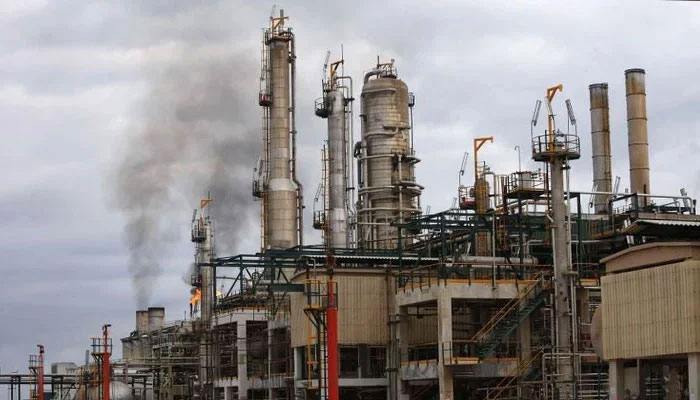Govt moves to finalise binding supply terms between refineries, OMCs
KARACHI: The government has initiated the process of finalising a mutually agreed legal framework between oil marketing companies (OMCs) and refineries, aimed at introducing binding obligations in their supply contracts, The News has learnt.
Deliberations will be held with stakeholders from across the oil sector to incorporate key provisions into the agreement, including a take-or-pay clause, officials said.
The move comes in response to an ongoing dispute between refineries and OMCs over the upliftment and import of petroleum products -- particularly high-speed diesel (HSD). Refineries recently raised objections to HSD imports, citing adequate domestic production, even as OMCs continued to secure import permissions.
The Oil and Gas Regulatory Authority (Ogra) has formed a committee to address the matter and has asked both refineries and OMCs to nominate representatives for the body, which is expected to convene its first meeting soon.
Sources said that although OMCs commit to uplifting petroleum products from local refineries during the Product Review Meeting (PRM), they have not been honouring those commitments. Under existing government policy, domestically produced petroleum products are to be uplifted first, according to the established merit order.
In the event of a shortage, Pakistan State Oil (PSO) is authorised to import HSD from Kuwait Petroleum Corporation (KPC) under a long-term government-to-government contract. Other OMCs may only import if shortages persist despite PSO’s imports.
However, sources noted that one OMC remains intent on importing HSD despite sufficient local availability. According to sources, the proposed mechanism will include binding clauses that would require OMCs to uplift available local supplies before resorting to imports. Under the take-or-pay clause, OMCs would be obligated to uplift the quantities allocated in the PRM. Conversely, refineries would be required to share margins with OMCs if they fail to supply agreed volumes despite earlier commitments. This new mechanism has been deemed necessary following months of friction between refineries and OMCs regarding HSD imports.
Sources added that the country currently holds sufficient stocks of petroleum products, with HSD reserves at 604,000 metric tonnes, petrol at 470,000 metric tonnes, and furnace oil at 401,000 metric tonnes.
-
 Jasmine Crockett Nearly Tied With James Talarico In Texas Senate Primary
Jasmine Crockett Nearly Tied With James Talarico In Texas Senate Primary -
 UK Tightens Visa Rules, Suspends Study Visas For Four Countries, Halts Work Visas For Afghan Nationals
UK Tightens Visa Rules, Suspends Study Visas For Four Countries, Halts Work Visas For Afghan Nationals -
 Texas Voting Results Impacted As Court Halts Counting Of Late Dallas Ballots
Texas Voting Results Impacted As Court Halts Counting Of Late Dallas Ballots -
 Christina Applegate Confesses She Was 'madly In Love' With Johnny Depp
Christina Applegate Confesses She Was 'madly In Love' With Johnny Depp -
 Kanye West's Insane Spending Habits Revealed: 'He Could Afford It'
Kanye West's Insane Spending Habits Revealed: 'He Could Afford It' -
 Nepal To Vote In First Election Since Gen Z-led Protests Ousted Government
Nepal To Vote In First Election Since Gen Z-led Protests Ousted Government -
 Megan Fox Breaks Social Media Silence: 'I'm Alive'
Megan Fox Breaks Social Media Silence: 'I'm Alive' -
 Prince William Relying On TWO Royals For ‘valuable Support’
Prince William Relying On TWO Royals For ‘valuable Support’ -
 Demi Lovato Gets Honest About Her 'bratty' Behavior During Disney Days
Demi Lovato Gets Honest About Her 'bratty' Behavior During Disney Days -
 Megan Fox Makes Blunt Admission About Never Loving Her Body?
Megan Fox Makes Blunt Admission About Never Loving Her Body? -
 Princess Diana Relished THIS British ‘comfort Food’, Reveals Expert
Princess Diana Relished THIS British ‘comfort Food’, Reveals Expert -
 Ryan Gosling Reveals Secret Role Played By His Daughters In 'Project Hail Mary'
Ryan Gosling Reveals Secret Role Played By His Daughters In 'Project Hail Mary' -
 Kate Middleton ‘powerful Style Statement’ Keeps Away From ‘distractions’
Kate Middleton ‘powerful Style Statement’ Keeps Away From ‘distractions’ -
 Madeline Ross, Sister Of Popular Streamer Adin Ross, Dies At 36
Madeline Ross, Sister Of Popular Streamer Adin Ross, Dies At 36 -
 Christina Applegate Confesses She Realized Ex Johnathon Schaech 'was Not The Man' On Wedding Day
Christina Applegate Confesses She Realized Ex Johnathon Schaech 'was Not The Man' On Wedding Day -
 Princess Diana Disliked ‘silly’ Day Celebrated By Youth
Princess Diana Disliked ‘silly’ Day Celebrated By Youth




